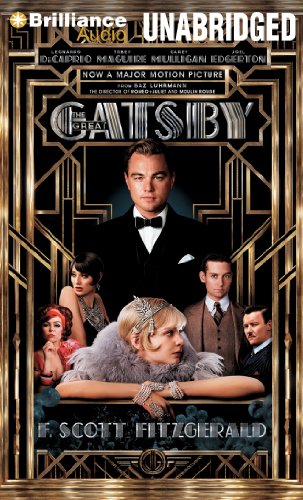
F. Scott Fitzgerald’s classic American novel of the Roaring Twenties is beloved by generations of readers and stands as his crowning work. This new audio edition, authorized by the Fitzgerald estate, is narrated by Oscar-nominated actor Jake Gyllenhaal (Brokeback Mountain). Gyllenhaal’s performance is a faithful delivery in the voice of Nick Carraway, the Midwesterner turned New York bond salesman, who rents a small house next door to the mysterious millionaire Jay Gatsby. There, he has a firsthand view of Gatsby’s lavish West Egg parties – and of his undying love for the beautiful Daisy Buchanan. After meeting and losing Daisy during the war, Gatsby has made himself fabulously wealthy. Now, he believes that his only way to true happiness is to find his way back into Daisy’s life, and he uses Nick to try to reach her. What happens when the characters’ fantasies are confronted with reality makes for a startling conclusion to this iconic masterpiece. This special audio edition joins the upcoming film – as well as many other movie, radio, theater, and even video-game adaptations – as a fitting tribute to the cultural significance of Fitzgerald’s Jazz Age classic, widely regarded as one of the greatest stories ever told.In 1922, F. Scott Fitzgerald announced his decision to write “something new–something extraordinary and beautiful and simple + intricately patterned.” That extraordinary, beautiful, intricately patterned, and above all, simple novel became The Great Gatsby, arguably Fitzgerald’s finest work and certainly the book for which he is best known. A portrait of the Jazz Age in all of its decadence and excess, Gatsby captured the spirit of the author’s generation and earned itself a permanent place in American mythology. Self-made, self-invented millionaire Jay Gatsby embodies some of Fitzgerald’s–and his country’s–most abiding obsessions: money, ambition, greed, and the promise of new beginnings. “Gatsby believed in the green light, the orgiastic future that year by year recedes before us. It eluded us then, but that’s no matter–tomorrow we will run faster, stretch out our arms farther…. And one fine morning–” Gatsby’s rise to glory and eventual fall from grace becomes a kind of cautionary tale about the American Dream.
It’s also a love story, of sorts, the narrative of Gatsby’s quixotic passion for Daisy Buchanan. The pair meet five years before the novel begins, when Daisy is a legendary young Louisville beauty and Gatsby an impoverished officer. They fall in love, but while Gatsby serves overseas, Daisy marries the brutal, bullying, but extremely rich Tom Buchanan. After the war, Gatsby devotes himself blindly to the pursuit of wealth by whatever means–and to the pursuit of Daisy, which amounts to the same thing. “Her voice is full of money,” Gatsby says admiringly, in one of the novel’s more famous descriptions. His millions made, Gatsby buys a mansion across Long Island Sound from Daisy’s patrician East Egg address, throws lavish parties, and waits for her to appear. When she does, events unfold with all the tragic inevitability of a Greek drama, with detached, cynical neighbor Nick Carraway acting as chorus throughout. Spare, elegantly plotted, and written in crystalline prose, The Great Gatsby is as perfectly satisfying as the best kind of poem.

Shines Brilliantly Like a Just-Discovered Piece of Cameo Jewelry from a Bygone Era It’s difficult to give any even-handed critique F. Scott Fitzgerald’s standard-setting Jazz Age novel since it was required reading for most of us in high school. However, if you come back to it as a full-fledged adult, you’ll find that the story still resonates but more like a just-polished cameo piece from a forgotten time. At the core of the book is the elaborate infatuation Jay Gatsby has for Daisy Fay Buchanan, a love story portrayed with both a languid pall and a fatalistic urgency. But…
Decades later, still great but on different terms. Having reread this book for the first time in 20 years, I can confirm that there’s a reason that it’s considered one of the very best American novels. However, my reaction to the story was different than when I first read it in high school. I recall that back then I was hoping that Daisy and Gatsby’s love story would ultimately yield a happy ending. Now, I found them both to be such shallow creatures that they inspired no pity. While I considered the characters to be emotionally stunted, that…